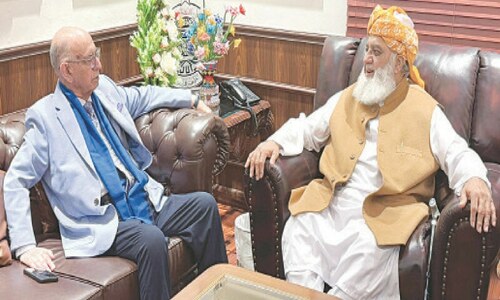ISLAMABAD, April 16: The European Union has urged Pakistan to undertake electoral reforms as a matter of priority and said that the February 18 polls fell short of international standards for genuine democratic elections.
“Although the Feb 2008 elections were competitive and the results were accepted, there are enduring problems with the framework and conditions for elections in Pakistan,” chief observer of the EU Election Observation Mission and Member of European Parliament (MEP) Michael Gahler said on Wednesday while launching the final assessment report on the elections.
The 70-page report examines the complete electoral process and recommends 83 steps for improving the election framework and conditions. The EU mission was in Pakistan from December 9, 2007 to March 10 this year to observe the pre-poll activities, voting process, consolidation of results, and post-election developments, including complaints and appeals and assess them on the basis of international standards.
The EU had earlier issued a preliminary report immediately after the elections in which it pointed out that level-playing field had not been provided to opposition candidates and state resources had been misused in favour of candidates belonging to former ruling parties.
Mr Gahler cautioned that if corrective measures were not taken in the problematic areas identified after the Feb 18 elections, there was a serious risk of electoral problems in future.
Stressing the need for reforms, he said, it was a situation of ‘now or never’. “I will be returning in a year’s time and hope to see some significant advances,” Mr Gahler said, adding that the international community would be keenly following the progress in this regard.
The recommendations made after the 2002 elections, he said, had not been implemented, creating problems for the 2008 polls to meet international standards.
The problematic areas identified by the EU concern citizens’ right to take part in the government, freedoms of expression, association and assembly and the right to an effective remedy, to non-discrimination, and universal and equal suffrage.
Expressing doubts about certain election results, the report said: “The EU EOM is aware of suspicious results in a number of constituencies, including polling stations with implausibly high turnouts and questionable margins of victory.”
Mr Gahler said that in most of such cases the former ruling parties had benefited.
It regretted that the Election Commission did not notice these malpractices, rather it made sweeping rejections of complaints filed by unsuccessful candidates, thus denying a fast and effective mechanism for redressal through re-counting and re-polling of votes.
Besides, the report called for an independent judiciary enjoying the public confidence to act as an effective watch on the electoral process.
Before elections many judges, including the chief justice, were removed following an executive order, damaging public confidence in the independence of the judiciary and the rule of law, it said.
“Independence of the superior courts was undermined by the fact that all judges had sworn an oath under the controversial Provisional Constitutional Order (2007) and, therefore, were perceived to be close to President Musharraf and the former ruling parties.”
The report laid special emphasis on independence of the Election Commission and the election administration.
About shortcomings in election administration, it said there was insufficient provision for the independence of the election administration and transparency in its work, especially with regard to the results process.
The report documents lacunas in the functioning of the ECP, saying it lacked transparency in key areas of its work, and did not formally consult with political parties and other stakeholders.
The ECP, it said, did not take sufficient responsibility for various aspects of the process, including supervising the work of returning officers, enforcing the code of conduct for parties and candidates, staff training, voter education, complaints resolution and re-counting and re-polling.
Recommending restructuring of the ECP, the report suggested that it should operate transparently and consultatively and take full responsibility for its mandated tasks. It also urged appointment of the chief election commissioner and election commission members in consultation with stakeholdera and a process that provided for the independence of the commission.
The legislative framework for elections at present did not provide an adequate basis for the conduct of genuine democratic elections, the report said, adding that a number of areas needed to be more precisely regulated and brought in line with international standards.
The report also said that efforts should be made to reduce women’s severe under-representation in the electoral process and ensuring impartiality of state media’s broadcasts, which were found to be biased in favour of the former ruling party.















































Dear visitor, the comments section is undergoing an overhaul and will return soon.